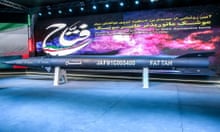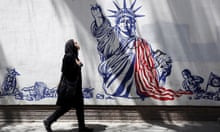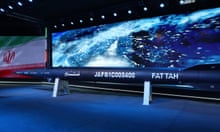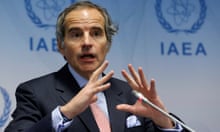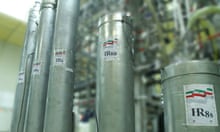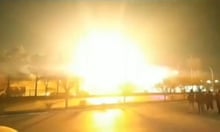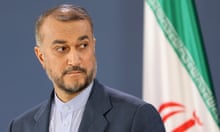The UN nuclear watchdog chief has said he has had “constructive” meetings with Iranian officials in Tehran after the discovery of uranium particles enriched to near weapons-grade level.
The two-day visit by the head of the International Atomic Energy Agency (IAEA), Rafael Grossi, comes as the Vienna-based organisation seeks greater cooperation with Iran over its nuclear activities.
“By having a constructive discussion … and having good agreements, like I am sure we are going to have, we are going to be paving the way for important agreements,” Grossi told a news conference on Saturday alongside the head of Iran’s atomic energy organisation, Mohammad Eslami.
Grossi arrived in Iran on Friday amid a deadlock in negotiations on reviving the 2015 accord on Iran’s nuclear activity, known formally as the joint comprehensive plan of action (JCPOA).
A diplomatic source told AFP the IAEA chief would meet the Iranian president, Ebrahim Raisi, during his trip to “relaunch the dialogue” on Iran’s atomic work and to “reset the relationship at the highest level”.
Grossi had made clear “that he was only prepared to go to Tehran if he had an invitation to speak with the president”, the source added.
Uranium particles enriched by up to 83.7% – close to the 90% required to produce an atomic bomb – had been detected at Iran’s underground Fordow plant about 100km (60 miles) south of the capital, according to a confidential IAEA report seen by AFP this week.
Tehran denies wanting to acquire atomic weapons, and said it had not made any attempt to enrich uranium beyond 60% purity.
Iran’s government noted that “unintended fluctuations … may have occurred” during the enrichment process.
The discovery came after Iran had substantially modified an interconnection between two centrifuge clusters enriching uranium, without declaring it to the IAEA.
Grossi was greeted on Friday at Mehrabad international airport by Behrouz Kamalvandi, spokesperson for the Atomic Energy Organisation of Iran, and later met the agency’s chief, Eslami.
At the joint press conference on Saturday, Eslami called for other signatories of the 2015 deal to fulfil their “obligations”.
“Three European and some other countries are just focusing on Iran’s JCPOA obligations,” he told the news conference. “They, too, have obligations that they need to adhere to.
“We came to an arrangement [with Grossi] to define our cooperation within the framework of the safeguards” on nuclear activity, he said.
Later on Saturday, Grossi met the Iranian foreign minister Hossein Amir-Abdollahian, the state news agency, IRNA, reported.
Before the meeting, Amir-Abdollahian told CNN that “the window for an agreement on negotiations to lift sanctions is still open, but this window will not be open for ever”.
During the visit, the IAEA director general aimed to secure “more access to the [Fordow] site, more inspections,” the diplomatic source said.
France, a signatory to the 2015 deal that promised Iran relief from economic sanctions in exchange for curbs on its nuclear activities, said on Thursday the new enrichment development was “unprecedented and extremely serious”.
The restrictions set out in the deal, including a 3.67% enrichment threshold, were intended to prevent Iran from developing a nuclear weapon.
The US unilaterally withdrew from the pact in 2018 under the then president, Donald Trump, and reimposed sanctions, prompting Iran to suspend the implementation of its own commitments. Negotiations aimed at reviving the deal started in 2021 but have been stalled since last year.
Grossi’s visit is being seen in Iran as another indication that a dialogue-based approach to resolving the nuclear standoff is possible.
“It is hoped that this trip will form the basis for greater cooperation and a clearer horizon between Iran and the IAEA,” Kamalvandi said before Grossi’s arrival.
Depending on the outcome of Grossi’s trip, the US, as well as Britain, France and Germany, will decide whether to submit a draft resolution censuring Iran to the IAEA board of governors, which is due to convene next week in Vienna.
In November 2022, western countries criticised Iran for its lack of cooperation after traces of enriched uranium were found at three undeclared sites.
Grossi last visited Iran in March last year, in a trip that was focused on those sites.
The IAEA said Grossi would hold a news conference upon his return to Vienna on Saturday afternoon.




